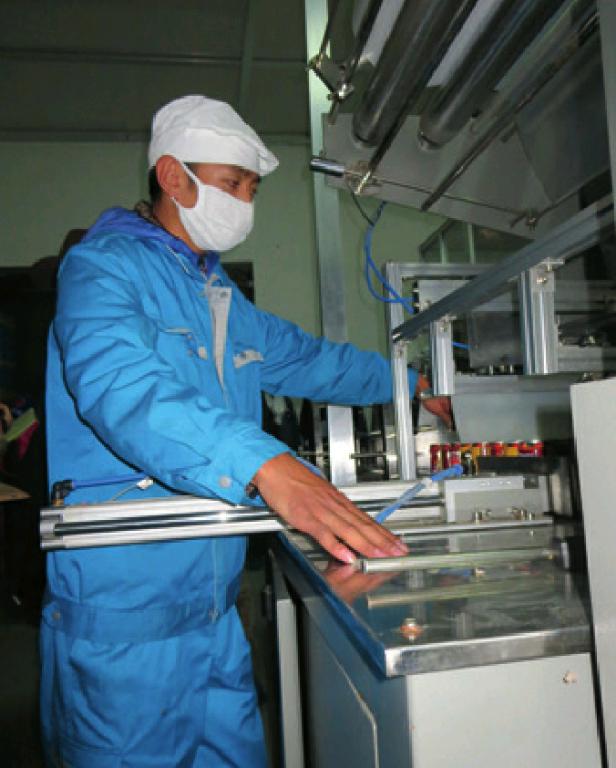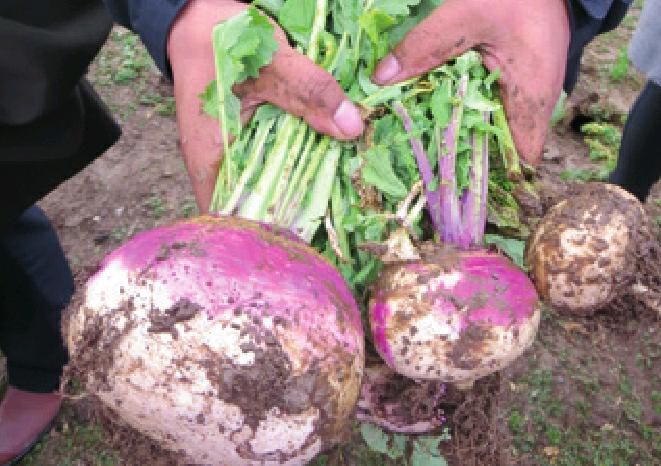New Pathways To Prosperity
2017-03-01ByGeLijun
By+Ge+Lijun
In a small workshop in Chindu County of Yushu Tibetan Autonomous Prefecture, Qinghai Province, about a dozen workers are busy packaging beverage cans. However, just a few years ago, these skilled and meticulous workers were horse-riding herders. Thanks to an unexpected and fortunate career change, they have now left poverty behind them and have stepped on the path to prosperity.
Twenty-eight-year-old Jamyong is one of them. Under the governments policy of returning grazing land to grassland to protect the environment, he and many other herdsmen of Chindu began moving into the county seat.
Growing up in a family of herdsmen, Jamyong soon realized he had no marketable skills outside of the grasslands. After considering his situation, the local poverty alleviation department found him an appropriate job.
“In the past, people in my village were all herdsmen, but gradually, the grazing land became smaller and there were fewer yaks and sheep. When I moved to the county seat, with the help of the government, I came to work at Bayanhar Beverage Co. Ltd. to package beverage cans, where I earn a monthly income of 3,000-4,000 yuan ($450-600),”he told ChinAfrica, a monthly publication of Beijing Review.
Bayanhar Beverage is a small-sized company founded in 2004, whose employees all come from relocated and poor households. The company uses a turnip-like highland plant called yuangen as a raw material to produce a beverage. According to scientific research, yuangen has good anti-hypoxia properties, which are critical on the QinghaiTibet Plateau with an average altitude of more than 4,000 meters above sea level.
Tripartite model
Grassland animal husbandry used to be the pillar industry of Chindu, but in recent years, under the guidance of the county government, many locals have given up husbandry to focus on planting yuangen.
Yuangen has a high yield of up to 15 tons per hectare, which encourages local people to reclaim wastelands to make place for the precious plant. Its bulk purchase price is about 2 yuan ($0.15) per kg, which is far higher than highland barley and potatoes.
“For more than a decade, the government has always provided strong support to our business,” said Li Hongwei, General Manager of Bayanhar Beverage.
In 2014, Lis company received a 200-million-yuan ($29.4 million) grant from the provincial poverty alleviation funds and 1.5-million-yuan ($220,000) grant from the county poverty alleviation funds to build a new factory and update equipment.
With these new resources, the beverage company opened up two production lines to produce yuangen-based beverage and purified water. The monthly income of local workers can reach up to 4,000 yuan ($600).
The company uses an innovative tripartite model of development consisting of three pillars: a farming base, former herder households and the company itself. Through this model, villagers can plant and grow yuangen in the companys farming base, which they then sell to the company on a contractual basis.
The number of employees varies according to the planting and harvesting seasons of yuangen. More than 60 workers work in the factory during the harvest season, but only a dozen or so during the off-season. “This flexible employment policy allows employees to spend more time on other jobs during the off-season, such as transportation, to increase their household income,” said Gensum Qogzhin, a 26-year-old accountant at Bayanhar Beverage.
How have these herders come to master these production skills? Li Hongwei said that he had put in a lot of time and energy into training them. “We have difficulties in finding technicians who can stay and work here for a long time. So we have to study by ourselves and then provide trainings for the employees.”
But training has proven effective, as evidenced by Jamyongs successful career conversion. “Packaging beverage is totally different from herding,” he said. “I have received several trainings before I could accomplish my work efficiently.”
According to Li, the company successfully gained a foothold in Tibet and Sichuan markets in 2015, with more than 4 million cans of yuangen-based drinks sold annually. Currently, more than 2,000 people in over 700 families have benefited from the expansion of yuangen-based products industry in Chindu.
Local leverage
Statistics show that up till now, there are still 18,000 people in Chindu living in poverty, and lifting them out of poverty is not going to be an easy task.
But local people can count on the help of the local government, whose poverty alleviation philosophy has shifted from “giving out money” to “building peoples capacity.” This involves formulating a locally adapted antipoverty industrial plan to further develop agriculture, ethnic cultural industry, tourism and ecological industry.
At the same time, local authorities have strengthened infrastructure construction in impoverished villages, such as water, electricity, road and communication facilities, in an attempt to provide a solid basis for local industrial development.
Bayanhar Beverage is not the only company engaged in local poverty alleviation efforts in Chindu. Plateau Yak and Livestock Products Co. Ltd. has adopted a similar tripartite model of development since its establishment, relying on a grazing base, herdsmen and the company.
In order to guarantee the companys supply of yak meat, 38 professional animal husbandry cooperatives have been set up, and this has lifted more than 2,000 herding families out of poverty.
“Im very satisfied with this job, which helps us live a better life,” Ngagwen, a female worker in the production workshop, told ChinAfrica. Her family was one of those listed for poverty relief because of their low number of yaks and sheep. After coming to work at the company, she now has a secured monthly income of 2,000 yuan ($296).
“Without the governments support, we could not have achieved such remarkable results,” said Zhu Qingwen, General Manager of Plateau Yak and Livestock Products Co.
In May 2008, with the support of Chindu Government, Zhu purchased a meat processing plant and established his company. Not long after, his company began to engage in processing and sale of yak meat and products. In just six years, the yak meat produced by the company has even reached Shanghai Wal-Mart, allowing Shanghai residents to enjoy the delicacies of the high plateau.
Relevant departments of Chindu have also focused their efforts on the tourism industry, namely the Gardo Jonwo Scenic Spot, rich in both natural and cultural beauty.
Local authorities encouraged herdsmen to acquire shops and set up catering, accommodation and retail services to increase revenues in two traditional animal husbandry-based villages where the scenic spot is located. Besides, the government also held various kinds of targeted training related to farming and breeding to help local residents acquire new marketable skills.
Overcoming poverty through industrialization is the best method for improving the ability of local population to lift themselves out of poverty by leveraging their own resources, Gama Gyurme, Director of Chindu County Poverty Alleviation and Development Bureau, told ChinAfrica.
“We must further research and consolidate the emerging yuangen-based products industry. In addition, we should also better master animal husbandry, because it is a pillar industry in pastoral areas. Only by better developing animal husbandry industry can we lead more herdsmen to prosperity. At the same time, we should keep on exploring more competitive industries and create more opportunities for local people to get rich,” he said.
